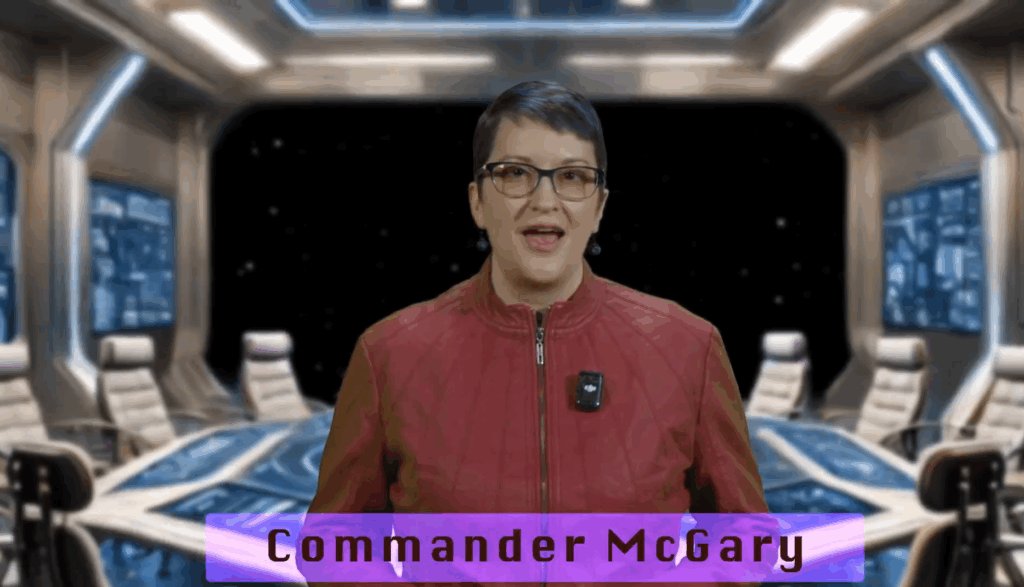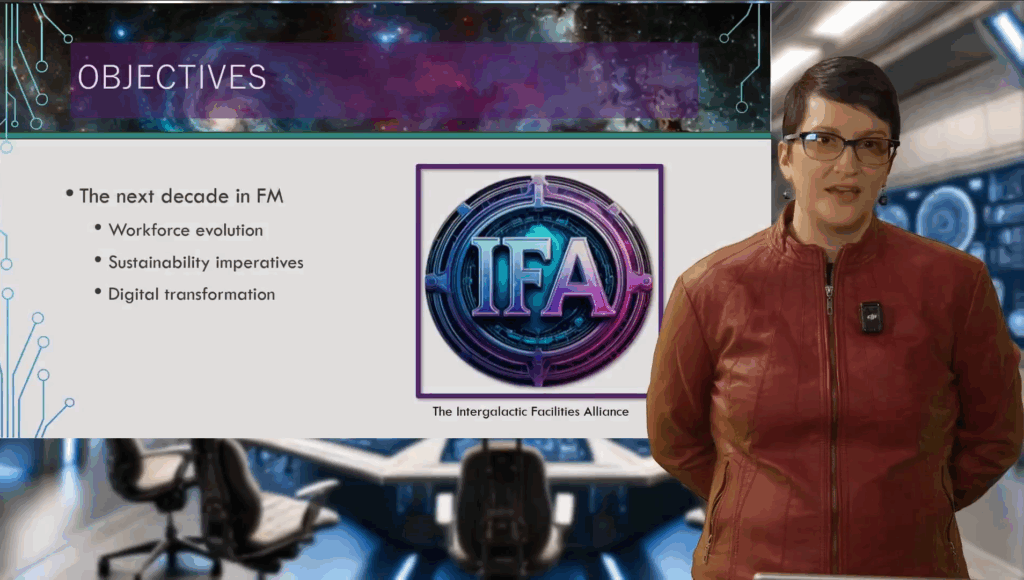Last updated on December 19, 2025
Sometimes, traditional online courses can feel dry—lecture, reading, test, repeat. Even activities meant to increase engagement, like discussions, can become transactional miniature essays. Students disengage, and instructors can get stuck in a rut. That disengagement can also negatively impact drop/fail/withdraw rates, especially online.
As part of the Spring 2025 development cycle, Professor Carolyn McGary, Director of the CPM Program, worked with the CTLD Instructional Design Team to create an online synchronous version of CPM 2010: Building Systems and Technology. This course combines storytelling, gamification, OER, and a flipped-classroom approach to offer a creative, engaging alternative to the traditional online course.

Carolyn and the CTLD introduced the story of the Intergalactic Facilities Alliance (IFA), which solves facility management problems across space. In this OER course, Carolyn becomes the IFA Commanding Officer and students become cadets, completing their training to become IFA Operatives. Students meet objectives by assessing facility needs in fictional space locations, developing solutions, and applying advanced building technologies.
Contents
Video Spotlight
[Length 5:22, CC Available]
Storytelling

This course is structured as a narrative where students play an active role. Across eight two-week missions, students progress through modules framed by mission briefings and debriefings that pull the content into the larger narrative. Themed naming conventions reinforce the story—students are cadets, classes become Squadron Assemblies, and synchronous activities are Squadron Challenges. A consistent color scheme, graphics, and video create an immersive experience.
This was a completely different type of learning experience than most students have experienced. To reduce confusion, the course begins by introducing the story and outlining expectations. A glossary of terms helps clarify fictional terminology.
Gamification

We know from Cognitive Learning Theory and Active Learning Models that there’s a correlation between student engagement and how they process information. Students who are actively engaged in a course process information more deeply and create stronger associations with what they’re learning. We incorporated gamification to boost engagement through badges that mark progression toward becoming an IFA Operative. Because we do not have built-in badging in Canvas, we used AI-generated images and module unlocking to create our own system. When students complete a module, a new one unlocks along with a badge graphic.

We also incorporated interactive simulations, using a choose-your-own-adventure format, to present real-world-style scenarios that require student decision-making and reflection. This allows students to apply learning in realistic contexts and connect it to their own careers.
Exploration and Interactive Learning

To promote deeper learning, the course encourages exploration rather than memorization. A flipped classroom model allows students to complete asynchronous content: readings, videos, discussions, and knowledge checks, on their own, saving synchronous time for hands-on practice and deeper exploration.
Though the course story is fictional, the skills are real. Simulations demonstrate real-world relevance, and students may choose how to submit assignments, providing agency and incorporating andragogical strategies. The flipped classroom approach, inclusion of a glossary of terms, and student choice in how to submit assignments support UDL principles of multiple means of representation, action, and expression.
OER
To minimize student costs, we adapted OER content instead of requiring a textbook. Challenges included finding relevant content and aligning Creative Commons licenses, especially for topics with limited existing OER. Carolyn created and remixed original content with existing materials to align with the objectives and fit with the sci-fi theme. The result was a seamless, rigorous, and engaging presentation of course content.
Conference Presentation Case Study
At the Colorado OER Conference in May 2025, Professor McGary and Course Developer Jennifer Whitton-Trujillo included this video about CPM 2010 as a case study overview in their presentation on reimagining OER through storytelling and gamification.
[Length 3:40, CC Available]
Conclusion
The revamped CPM 2010: Building Technology and Software course represents a bold step forward in online learning design at MSU Denver. By fusing narrative, gamification, and open educational resources within a flipped-classroom model, Professor Carolyn McGary and the CTLD Instructional Design Team have created an immersive, student-centered experience that breaks free from the traditional lecture-and-test cycle.
Partnering for Continuous Improvement in Teaching and Learning
A significant factor in the success of these and similar projects is the support and funding from the Offices of Online Learning (OOL) and Innovative and Lifelong Learning (I&LL), which have been instrumental in enhancing the quality of our online educational endeavors. OOL’s and I&LL’s support and contributions have empowered faculty members to innovate and create a more enriching educational environment for all. Please visit the Office of Online Learning and Innovative & Lifelong Learning for more information about all that they are doing to help MSU Denver faculty members and students.
Want to get involved?
One way to find help with implementing student supports in your course is the CTLD Course Development Cycle. This is an intensive, but rewarding, process where an instructional designer will work with you over the course of several months to identify course objectives, develop learning activities, create a user-friendly course, record high-quality multimedia content, and much more.
For more information on the CTLD Development Cycle, as well as how to apply to join, please see our CTLD Course Development Cycle spotlight.
Have questions?
Want help on this or other teaching and learning topics? Please visit us for drop-in support (10 am-3 pm, M-F) or try one of our self-help tutorials.